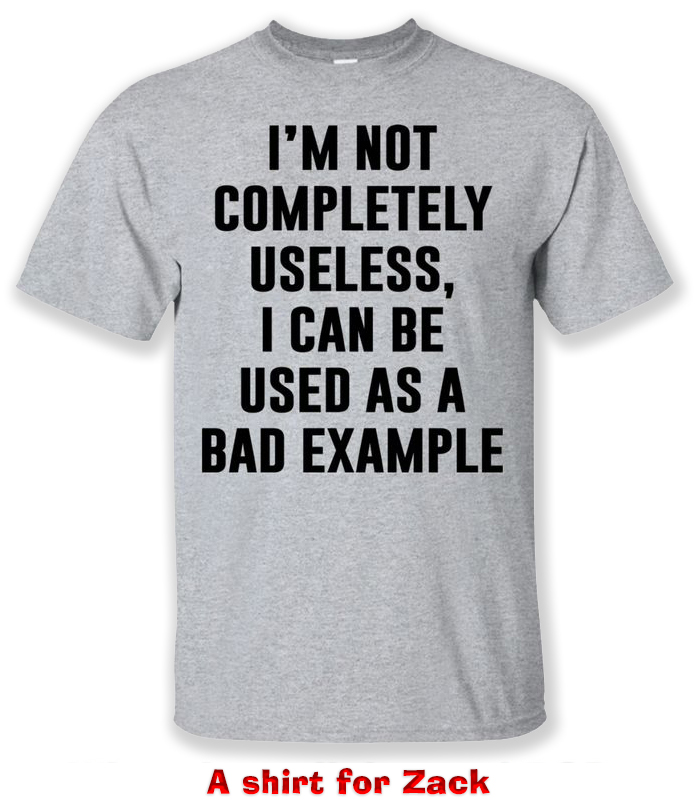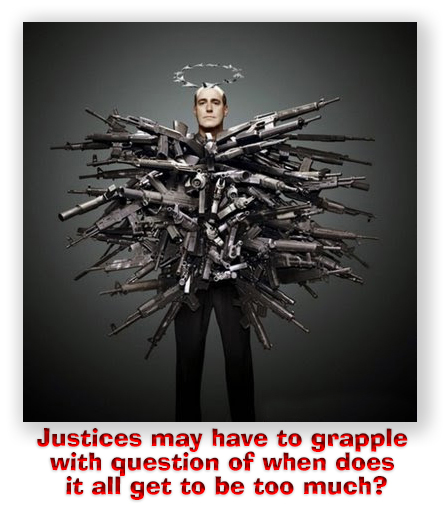We post news and comment on federal criminal justice issues, focused primarily on trial and post-conviction matters, legislative initiatives, and sentencing issues.

CAN I CALL ‘EM OR WHAT?
 In the wake of the Rahimi decision holding that the 2nd Amendment does not prevent the Feds from prohibiting people subject to domestic protection orders from having a gun, the Solicitor General filed a surprising request with the Supreme Court that it immediately grant review to a swath of felon-in-possession cases in order to settle the issue of whether 18 USC § 922(g)(1) can be constitutionally applied to a variety of situations and disqualified people.
In the wake of the Rahimi decision holding that the 2nd Amendment does not prevent the Feds from prohibiting people subject to domestic protection orders from having a gun, the Solicitor General filed a surprising request with the Supreme Court that it immediately grant review to a swath of felon-in-possession cases in order to settle the issue of whether 18 USC § 922(g)(1) can be constitutionally applied to a variety of situations and disqualified people.
I jubilantly reported this development and confidently hinted that a new day would soon dawn on the application of a statute responsible for about one-fifth of all federal criminal convictions. Content with my prognosis, I departed for a week in windswept but beautiful Iceland.
I returned to find out that my prediction was (once again) wrong. But then, I had plenty of company, including the SG, who lost her bid for a quick turnaround on felon-in-possession. On July 2, the Supreme Court cleared its plate of five pending § 922(g)(1) petitions for review by GVR, ordering them back to the lower courts to be reheard in light of Rahimi.
This means that the horizon for a definitive decision on the constitutionality of 18 USC § 922(g)(1) is now more like two years than one. The various courts of appeal will have to review the remanded cases through the Rahimi lens, one which permits an expanded view of what historical gun ban precedents are suitable analogues to § 922(g)(1)’s ban on felons possessing guns (which as a blanket prohibition only became law in the 1960s).

Rahimi emphasized that laws about general dangerousness could justify § 922(g)(8)’s banning gun possession while under a domestic violence restraining order. The Washington Post, however, complained last Sunday that “experts say the decision was written so narrowly that it does not make clear how to address other clauses of the same federal law… Critics say the Rahimi ruling does not solve the inherent problem created by Bruen — that judges are being asked to evaluate history, based on limited records assembled by dueling teams of lawyers.”
More importantly, Rahimi’s cautionary language that the Court was skeptical of broad categorical bans untethered to findings of dangerousness means that the Range holding that § 922(g)(1) is unconstitutional as applied to a guy who was convicted of a minor food stamp fraud 25 years ago will not change. At the same time, it is hard to believe that the 10th Circuit will not have to reverse its holding that Melynda Vincent – convicted of passing a bad $500 check 15 years ago when she was addicted to drugs but now a respected community leader in developing science-driven drug and criminal justice reform — can be prohibited from owning a gun consistent with the 2nd Amendment.
 The other cases are closer calls. Can a guy with prior violent offenses be banned under § 922(g)(1)? How about a guy whose felon-in-possession conviction was in connection with drug trafficking? Both of those issues will have to be addressed by courts of appeal before the issue is ripe for SCOTUS review.
The other cases are closer calls. Can a guy with prior violent offenses be banned under § 922(g)(1)? How about a guy whose felon-in-possession conviction was in connection with drug trafficking? Both of those issues will have to be addressed by courts of appeal before the issue is ripe for SCOTUS review.
Writing in his Sentencing Law and Policy blog, Ohio State University law professor Doug Berman said,
It seems SCOTUS has GVRed all the felon-in-possession cases that the US Solicitor General suggested be taken up right away in light of Rahimi. I am not really surprised the Justices are content to kick federal felon-in-possession cases down the road, but it simply ensures a lot more legal churn in lower courts (and perhaps a lot more people unconstitutionally prosecuted) as the Justice go off on their summer vacation and the rest of us try to read Rahimi tea leaves. There is little doubt in my mind that the Justices will have to resolve the constitutionality of § 922(g)(1) sooner or later, but they ultimately get to decide just when and how, while the rest of us deal with the legal uncertainty.
United States v. Rahimi, Case No. 22-915, 602 U.S. —, 219 L.Ed.2d 351 (June 21, 2024)
Garland v. Range, Case No. 23-374, 2024 U.S. LEXIS 2917 (July 2, 2024)
Vincent v. Garland, Case No. 23-683, 2024 U.S. LEXIS 2931 (July 2, 2024)
The Reload, Analysis: SCOTUS Passes Up Gun Ban Case… For Now (July 5)
Sentencing Law and Policy, Supreme Court grants cert on First Step resentencing, GVRs gun issues, and lots of statements in (final?) order list (July 2)
Washington Post, The Supreme Court upended gun laws nationwide. Mass confusion has followed. (July 7)
– Thomas L. Root
























